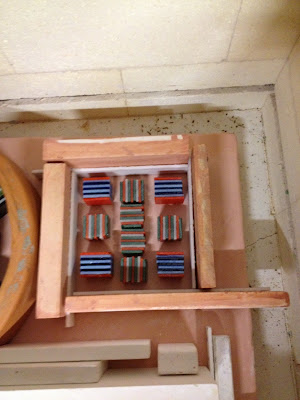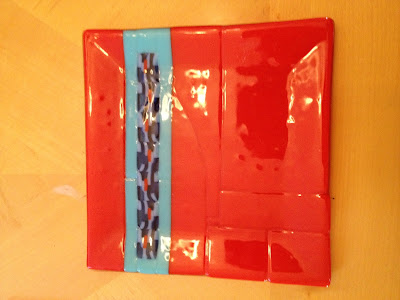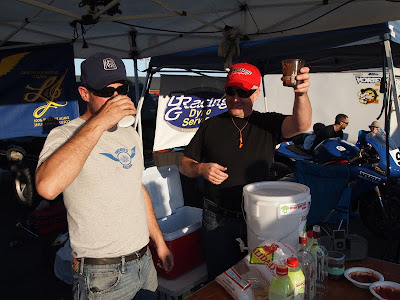Our original summer vacation plans this year were to leisurely drive through Yosemite and King's Canyon Nat'l Park, camping as we went. About two weeks before this was slated to happen, our friend Julio asked if we wanted to go tequila tasting in Mexico. The prestigious Tapatio distillery (not to be confused with the hot sauce) was celebrating its 75th anniversary, and a large group of gringos was invited to attend the celebration and tour other regional distilleries.
This was sure to be an epic adventure, so how could we say no? At the same time it made us apprehensive, because we both badly needed downtime from work. Tearing about Mexico with a bottomless glass of beer in one hand and tequila in the other did not sound especially relaxing. There was also the issue of getting both our expired passports renewed within one week, and otherwise preparing for a weeklong trip in a foreign country.
If you can believe it, Mickey also had a motorcycle race scheduled the day before our flight, and he was not about to sit it out. He made a mental list of all the bones he was allowed to break and still go to Mexico. Of course, in life as with driving, you sometimes "go where you look". During the race his front tire accidentally clipped the rear of the guy in front. The bike bucked Mickey off and he landed hard on his left shoulder, sliding a long ways on the asphalt. Upon standing, he heard sickening clicking sounds in his shoulder, and instantly diagnosed himself with a broken clavicle.
Once he was transported back to the pits in an ambulance, our racing friends Peter, Claudia, Pat, and Krista immediately pitched in to help deconstruct our camp and load it into our truck. Mickey and I made a beeline for the nearest emergency center in my car. We spent the next several hours waiting for X-rays and meds. The longer we waited, the more injured racers showed up. That little trauma center with its one doctor was flooded with patients that day, and half of them were racers!
Mickey's clavicle was pulverized pretty good. It only takes 14 lbs. of pressure to break it, we were told, and there was surely more force than that when he met asphalt. We ended up with a sling, some painkillers, and permission to hop on a plane the next day. Though he was in a lot of discomfort, I swear Mickey relished the tale he would tell of this little prelude to our trip!
Our flight to Jalisco left at midnight and only took 3 hours. I didn't sleep at all, even after drinking the delicious tequila that party members smuggled through security in 1 oz shampoo bottles. Then we're at the Guadalajara airport, waiting in customs for an eternity. We had no idea where we were going, how we were going to get there, or what anything would cost. That's a pretty complete recipe for adventure, if you ask me. Julio corralled everyone into a van and we were off to the little town of Tequila, appropriately.

The town of Tequila is small, around 27,000 people. What struck me were the narrow cobblestone streets, loud old vehicles belching smoke, and tiny storefronts, many of them selling tequila paraphernalia. Virtually no one speaks English, which threw me off quite a bit. After grabbing a breakfast of chilaquiles and dropping everything at the hotel, we visited Arrette, our first distillery. Ahh, *this* is what we came for! We had only heard about this process, and now we got to see it first-hand. The piles of trimmed agave cores, the roasting ovens, the fermentation vats and stills... Arrette is a small operation that creates an artisanal product, and it is delicious! Our hosts kindly invited the group for lunch in an area above the distillery. That was a real treat.

That evening we visited a tiny yet famous bar named La Capilla, where a drink called "The Batanga" originated. Don Javier Corona invented it in the 1960's and named it after one of his friends. Check out this short YouTube interview with him. A Batanga has lime juice, tequila, coke and salt, and it sure goes down easily.
The rest of the week we visited several other distilleries, both the small and the very large and corporate. It was interesting to contrast the techniques used by both. The larger distilleries had equipment that sped up the tequila-making process, by using high pressure to shorten the roasting times for the agave, for example. They would also extract the sugars from the plant with more efficient machinery like roller mills, which had the downside of drawing out harsher flavors. Below is a picture of a diffuser we saw at Don Roberto, which is the most efficient method for sugar extraction.

An interesting comment we heard from our guide at distillery Reserva de los Gonzalez, is that "if you have to wait 5 to 7 years for the agave plant to mature, why rush the tequila-making process?" One distillery held quite avidly to this philosophy and that was Fortaleza (or Los Abuelos as it's called in Mexico). Fortaleza tequila is made using all old-world methods, from grinding the roasted agave with a stone wheel, to fermenting it in open wooden vats, and then distilling the final product in copper stills, which removes harsh sulfurous compounds. Below are a couple of pictures - one of the fat, ripe agaves piled up on their property, and the other one the stone wheel, or tahona, used to grind them after roasting.
There's much more to relate about our trip, but this format is not the place for it. Next time we see you, we'll be sure to relate all the gory details and pour you some of the wonderful product that came back in our suitcases!
Labels: agave, Arrette, batanga, Fortaleza, La Capilla, Mexico, tahona, Tequila









































